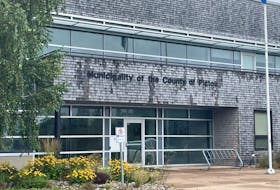The Nova Scotia Bird Society is once again reminding people to take down any bird feeders during the spring and summer months.
At least eight sightings of parasite-infected birds have been reported in Nova Scotia since June 14, bringing renewed attention to a disease that is both contagious and a fatal avian illness.
“In the last three days, we got between six and seven reports,” said society president David Currie. “We know it’s only just starting.”
The disease, called trichomonosis, is caused by a parasite that attaches to the digestive tract of its host. Infected birds may have drool or regurgitated food around their mouth and show signs of general lethargy, difficulty swallowing and poor flight ability.
Jeannie Fraser, who lives in Ben Eoin, Cape Breton, managed to film and photograph a purple finch from her house on Friday.
“It was awful,” Fraser said. “You’re seeing it trying to swallow and it was just horrific.”
Fraser said that she first noticed the bird on the railing of her home’s patio. She was able to get close to the bird before it finally flew away into a nearby hemlock tree, which is when she took the video.
“If people don’t take their feeders down, then one bird can regurgitate into the feeder and then the other birds can get sick,” said Fraser.
Trichomonosis was first observed in Atlantic Canada in 2007 and has been seen in all four Atlantic provinces ever since, though the number of cases vary from year to year.
“2017 was the worst that we’ve known and it affected all the provinces equally, but last year was only in Nova Scotia.”
With the number of sightings last weekend, Currie said it’s important people don’t do anything that can increase the spread, especially since there is no need for bird feeders in the summer months.
“There is no biological benefit to feeders in the summer. Most migrant birds come from South and Central America and they’re coming for the bugs and insects,” Currie said. “So by putting feeders out we’re just asking them to come closer and interact, and therefore the possibility of transmission of the disease is greater.”
The disease is not specific to the purple finch; it can infect other species as well. The bird society is asking people to record and report the time and place of any birds they believe to be infected.
Note: An earlier version of this story referred to the Canadian Wildlife Health Cooperative, which has been corrected to the Nova Scotia Bird Society.








